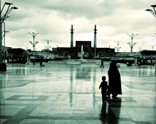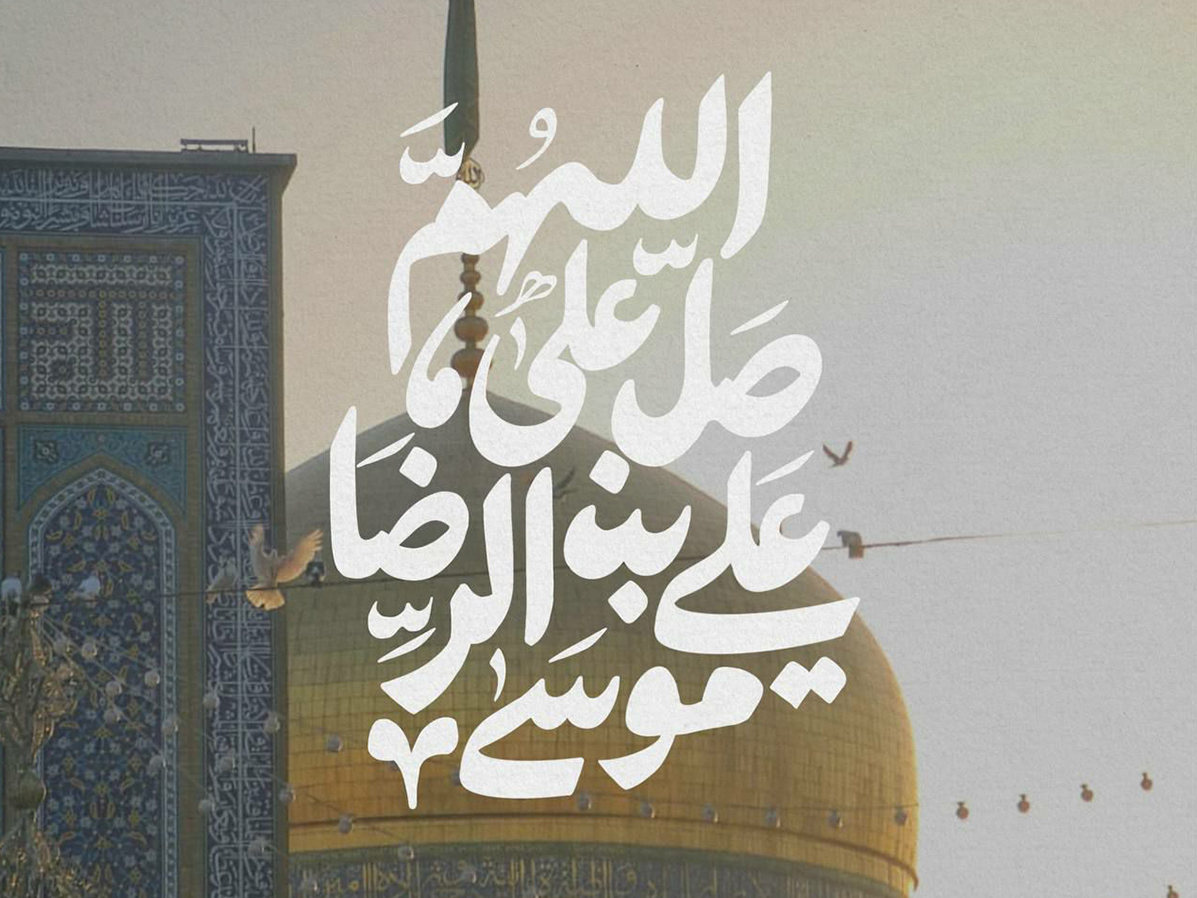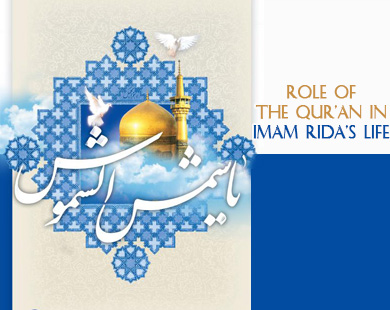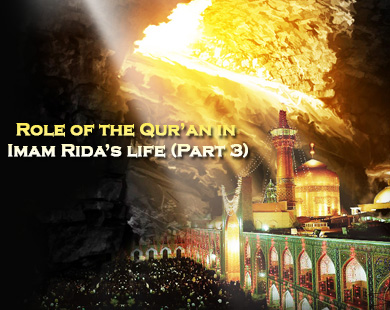One of the most prominent qualities of Imam al-Rida, peace be on him, is his devotion to Allah, the Exalted, and his clinging to Him. We can clearly see this quality in his acts of worship which represent great part of his spiritual life standing on light, Allah-fearingness, and piety. One of his companions has said: “When I saw him (al-Rida), I mentioned these words of Him, the Exalted: They used to sleep but little in the night.” Concerning his acts of worship, al-Shibrawi has said: “Throughout the night he (al-Rida) performed ablutions, prayed, and slept. In this manner he (continued) until the morning came.1”
The Imam, peace be on him, was the most Allah-fearing of the people of his time and the most obedient of them to Allah, the Most High. Al-Ma’mun sent Raja’ b. Abo al-Dahhak to Medina in order to bring the Imam to Khurasan. The latter went and accompanied him on the road from Medina to Maru. He has reported the following about his acts of worship: “By Allah, I have never seen a man more (earnest) than him in seeking protection in Allah (the Great and Almighty), mentioning Him in all his times, and fearing Him. When he rose in the morning, he performed the morning prayer. When he finished his prayer and said the taslim, he sat in his place of prayer and (began) glorifying Allah, praising Him, saying: ‘Allah is Greater! There is no god but Allah! O Allah bless the Prophet and his family, may Allah bless him and his family.’ He continued these phrases until the sun rose. Then he prostrated himself in prayer for a long time. Then he went to the people to speak to them and to preach to them until it was forenoon. Then he renewed his ablution and returned to his place of prayer. When the sun came near to descending (from its midday zenith), he stood and prayed six rak'as. In the first rak'a he recited the sura al-Hamd and the sura qul ya ayyuha al-kafirun. In the second rak'a he recited the sura al-Hamd and the sura qul huwa Allah ahad. In every rak'a of the four-rak'a prayers he recited the sura al-Hamd lillah and the sura qul huwa Allah ahad, and then he recited the taslim. Then he recited his personal prayer in the second rak'a before the kneeling and after the recitation. Then he said the adhan (the call to prayer). Then he prayed two rak'as.
Then he said the iqama (the declaration of standing for prayer) and performed the noon prayer. When he recited the taslim, he glorified Allah, praised Him, and said: ‘Allah is Greater! There is no god but Allah!’ He continued these phrases for a long time. Then he performed Salat al-Shukr (the prayer for giving thanks). In it he said: ‘Thanks be to Allah,’ for one hundred times. When he raised his head, he stood and prayed six rak'as. In each rak'a he recited the sura al-Hamd lillah and the sura qul huwa Allah ahad. After each two rak'as he recited the taslim. Then he said his personal prayer in the second rak'a before the kneeling and after the recitation. Then he said the adhan (the call to prayer). Then he prayed two rak'as and said his personal prayer in the second rak'a. When he recited the taslim, he stood and performed the afternoon prayer. When he recited the taslim, he sat in his place of prayer, glorified Allah, praised Him, and said: ‘Allah is Greater! There is no god but Allah!’ Then he prostrated himself in prayer and said one hundred times: ‘Thanks be to Allah.’
“When the sun set, he performed the ritual ablution, said the adhan and iqama, and performed the three rak'as of the evening prayer. Then he said his personal prayer in the second rak'a before the kneeling and after the recitation. When he recited the taslim, he sat in his place of prayer, glorified Allah, praised Him, and said: ‘Allah is Greater! There is no god but Allah.’ He recited these phrases for a long time. Then he performed Salat al-Shukr (the prayer for giving thanks). Then he raised his head and did not say anything until he stood and prayed four rak'as, finishing each two rak'as with the taslim. Then he said his personal prayer in the second rak'a before kneeling and after the recitation. In the first rak'a of these four rak'as, he recited the sura al-hamd and the sura qul ya ayyuha al-kafirun. In the second rak'a he recited the sura al-hamd and the sura qul huwa Allah ahad. Then he recited the taslim. Then he sat and recited personal supplications until he entered into evening. Then he broke the fast. Then he stayed until about third of the night passed. Then he stood and performed the night prayer in four rak'as. Then he said his personal prayer in the second rak'a before kneeling and after the recitation. When he recited the taslim, he sat in his place of prayer mentioning Allah, the Great and Almighty, glorifying and praising Him, saying: ‘Allah is Greater! There is no god but Allah!’ He said these phrases for a long time. After saying his personal supplications, he performed Salat al-Shukr, and then he went to bed.
“At the last third of night he got up glorifying and praising (Allah), saying: ‘Allah is greater! There is no god but Allah!’ And he asked Him for forgiveness. Then he cleaned his teeth with the miswak (cleaning stick for teeth). Then he performed the ritual ablution. Then he stood and performed the late night payer. He said eight rak'as. After each two rak'as, he recited the taslim. In the first two rak'as of them, he recited the sura al-hamd and the sura qul huwa Allah ahad thirty times.
“Then he performed the prayer of Ja‘far b. Abo Talib, which is four rak'as. After each two rak'as, he recited the taslim. After the second rak'a of each two rak'as, he said his personal prayer before kneeling. He regarded it as (part) of the late night prayer. Then he performed the other two rak'as. In the first rak'a he recited the sura al-hamd and the sura al-mulk. In the second rak'a he recited the sura al-hamd and the sura hal ata ‘ala al-insan. Then he stood and performed the two rak'as of al-Shafa‘. In each rak'a he recited the sura al-hamd one time and the sura qul huwa Allah ahad three times. He said his personal prayer after the second rak'a. Then he stood and performed (the prayer of al-witr), which is one rak'a. In it he recited the sura al- hamd, the sura qul huwa Allah ahad three times, the sura qul a‘oudhu bi Rab al-falaq one time, and the sura qul a‘oudhu bi Rab al-nas one time. Then he said his personal prayer before the kneeling and after the recitation. He would say (the following) in his personal prayer:
“‘O Allah, bless Mohammed and the Household of Mohammed. O Allah, guide us through him whom You guided, make us well through him whom You made well, attend to us through him to whom You attend, bless us in that which You have given, protect us from the evil of what You decreed, for You decree and none decrees against You. Verily he whom You befriend is not lowly, and he toward whom You show enmity is not exalted, blessed are You and high exalted!’
“Then he said seventy times: ‘I ask Allah’s forgiveness and seek repentance from Him.’ When he recited the taslim, he sat and recited supplications for a long time. When the dawn approached, he stood and prayed the two rak'as of the dawn. In the first rak'a he recited the sura al-hamad and the sura qul ya ayyuha al-kafirun. In the second rak'a he recited the sura al-hamad and the sura qul huwa Allah ahad. When the dawn broke, he said the adhan and the iqama and performed the prayer of the early morning in two rak'as. When he recited the taslim, he sat and recited supplications until the sun rose. Then he performed Salat al-Shukr (the prayer for giving thanks).2”
This tradition in detail displays: the obligatory prayer of Imam al-Rida, peace be on him; his supererogatory prayers; the suras of the Holy Qur’an which he recited in them; and the supplications which he recited after his prayers. This means that he was always busy worshipping Allah, the Exalted.
The love for Allah dominated the Imam‘s heart, sentiments and feelings, to the extent that it was one of his qualities.
* The life of Imam 'Ali Bin Musa al-Rida. by: Baqir Sharif al-Qarashi. Translated by Jasim al-Rasheed
1- Al-Ithaf bi Hub al-Ashraf, p. 59.
2- Al-Bihar, vol. 12, pp. 26-27. The tradition also includes the explanation of some of his supplications, his acts of worship, and his reciting some suras during his supererogatory prayers.




















